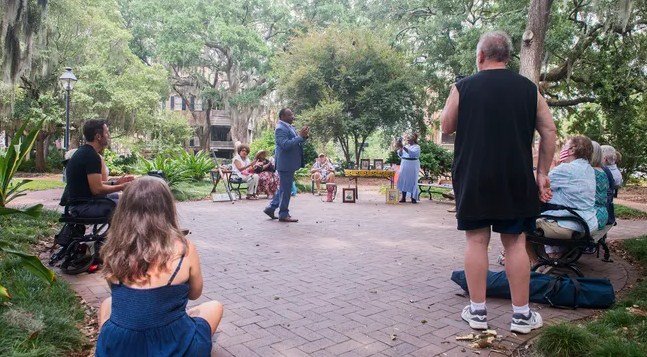Savannah, Georgia, is set to rename one of its historic public squares after a Black woman who taught formerly enslaved people to read and write during the Civil War. The city council will vote on Aug. 24 to choose a new name for the square that was formerly named after John C. Calhoun, a pro-slavery U.S. vice president.
Savannah removes Calhoun’s name from the square
The square near the southern edge of Savannah’s downtown historic district has been without a name since Nov. 10, 2022, when the city council voted unanimously to get rid of the name Calhoun Square. For more than 170 years, the park-like space was named for John C. Calhoun, a South Carolina politician who served in Congress and as U.S. vice president in two administrations before his death in 1850. Calhoun was among Washington’s most vocal supporters of slavery in the decades preceding the Civil War, which made him a target of racial justice advocates seeking to rid public spaces of statues and other markers honoring the Confederacy and white supremacists.
“This square has a lot of memories for what used to be,” said Patt Gunn, who gives guided tours focused on Savannah’s Black history. As a child, she often did homework on a bench in the square while her mother worked nearby. “It is honorable to say we can remove Calhoun.”
Susie King Taylor among the finalists for the new name
Nine months after leaders of Georgia’s oldest city stripped the name of Calhoun from the square, nominees being considered for the green space’s new name include Susie King Taylor, a Black woman who taught formerly enslaved people to read and write on the Georgia coast in 1862 with support from occupying Union soldiers. Taylor is among the finalists recommended for an honor Savannah hasn’t bestowed in 140 years: choosing a name to adorn one of the historic squares that are among the city’s signature features.
Taylor was born into slavery in 1848 in Liberty County, Georgia. She escaped with her family to St. Simons Island, where she met members of the First South Carolina Volunteers, an all-Black regiment of Union soldiers. She became their laundress, nurse, and teacher, and later wrote a memoir of her experiences. She also married Edward King, a sergeant in the regiment, and later Russell Taylor, a veteran of the Spanish-American War.
Taylor moved to Boston after the war and became active in several organizations, including the Women’s Relief Corps and the National Association of Colored Women. She died in 1912 and is buried at Mount Hope Cemetery in Boston.
Other nominees reflect Savannah’s diversity and history
A pair of citizen advisory panels has submitted six names for Savannah’s city council to consider for a scheduled Aug. 24 vote on a new name for the square. In a big break with the city’s past, none of the finalists are white men. Instead, the nominees are four Black people — a pastor, a formerly enslaved woman, a civil rights hero and an Army pilot — as well as Native Americans who inhabited the area when Savannah was founded and a group of women who in the 1950s put Savannah on the path to preserving its past.
“Regardless of what name is picked, it will be a name that represents more diversity in Savannah and sort of expands the story that Savannah tells about itself,” said Kristopher Monroe, chairman of the local Historic Site and Monument Commission that made its recommendations earlier this month.
The other nominees are:
- The Yamacraw, the Native American tribe that welcomed James Oglethorpe and his colonists when they founded Savannah in 1733.
- Mother Mathilda Beasley, Georgia’s first Black nun who founded an orphanage and school for Black children in Savannah in 1885.
- Reverend Andrew Bryan, a formerly enslaved man who became one of the first ordained Black Baptist ministers in Georgia and founded the First African Baptist Church in Savannah in 1788.
- W.W. Law, a civil rights leader who led voter registration drives, boycotts, and protests against segregation in Savannah in the 1950s and 1960s. He also helped preserve many historic buildings and artifacts related to Black culture in Savannah.
- The Seven Ladies, a group of women who formed the Historic Savannah Foundation in 1955 to save historic buildings from demolition and revitalize downtown Savannah.
- Frank Wills, an Army pilot who was born in Savannah and served as one of the Tuskegee Airmen during World War II. He flew 72 combat missions and received several medals for his service.
The city council will hear public comments on Aug. 19 before making its final decision on Aug. 24.

